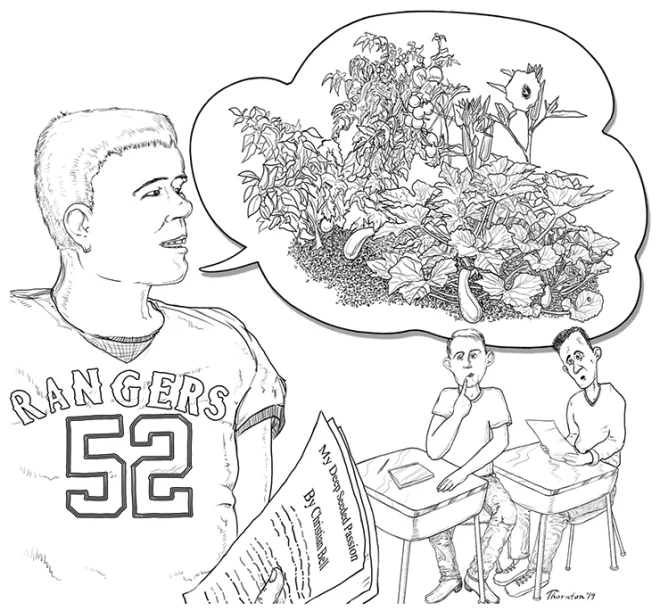
Dear Mr. Stone,
My name is Christian Bell, and I am a junior in high school from Greenwood—a small community a few miles outside of Midland, Texas. Ever since I can remember, I have enjoyed gardening with my family in our backyard. Living in West Texas, I have learned a unique style of gardening, for my area has poor, clay soil and infrequent rains, along with triple-digit heat for days on end during the Summer and hard frosts during the Winter. But I love gardening so much that I don’t mind whatever obstacles nature throws our way.
I originally wrote this essay for my English class when my teacher asked the class to write about something we are passionate about. At first, gardening did not cross my mind. Along with being an avid gardener, I am also an A student, a starting lineman on the varsity football team, and a varsity powerlifter. Over the years, I have learned not to talk about gardening much at school. Many of my friends don’t consider it “manly.“ They don’t want to hear me talk about my plants.
I wrote nearly an entire essay about football before I realized—at the last minute—that gardening is my true passion. I decided to tear up my previous draft and start over. I’m sure glad I did. I enjoy playing football, but gardening has had more of an impact on who I am today. Yes, I got a few snickers from classmates when they discovered what I wrote about. I just keep in mind that those people have never felt what it is like to grow a garden, so they would not understand my love for plants.
My first memories of working in a garden are faded and blurry. I was no more than two years old. I remember the intense sunshine beating down on my shoulders and the exuberant excitement I was feeling deep in my chest. Something was happening to me.
My mother tied a tool apron around my waist, filled the pockets with seeds, and put me to work. That day I mastered counting to three as I walked down the rows and put three seeds in each hole. Later on in the summer, I learned how to harvest, picking tomatoes, twisting squash, and plucking dill. I had never been more proud in my life.
When I was in grade school, I learned that caring for plants is not as easy as sow-ing and reaping. One hot summer day, I went out to the garden with my mother and saw that our cucumber leaves were covered with bright yellow streaks and spots. To my bewilderment, my mother immediately began uprooting all the vines. I broke down and cried. Why would my mother, the very person who nurtured these plants with me, kill them? When she saw me sobbing, my mother tenderly explained to me that plants can get sick just like humans. She told me that the bright yellow splotches were caused by the mosaic virus. The only way to stop it was to cull the affected plants, from leaf to root, and try again with new seeds. Did that failure make me want to quit? No, my passion for gardening only intensified.
I found out rather quickly the difference between a “good” weed and a “bad” weed. Good weeds are the ones that come up, roots and all, with a bit of a tug. Almost all of the weeds I encountered were like this, except for one: Bermuda grass. This baddest-of-the-bad weeds can send roots nearly a foot into the ground and grow back from just a sliver of stem left in the dirt.
One time my family came back from a week-long vacation. As soon as we got home, I ran to the garden fence and found that one section of our garden was covered with Bermuda grass, as thick as a carpet. It took nearly three seasons to eradicate this invasive weed. Once again, though, this only kindled my fire for gardening.
A couple of years later, a new enemy rose to power: cornworms. That season, almost overnight, the little devils bored holes up and down our okra, tomatoes, and squash plants. My dad drove into town and picked up several cans of Seven dust. We spread so much of the white insecticide that the garden looked like it was covered with snow. Too late. Cornworms destroyed much of our produce that year.
More recently, I learned about one more thing a gardener must deal with: the soil itself. Our harvests began to wane—and our soil was losing its rich aroma and dark color. I realized that it was becoming less and less fertile. Beginning the frigid winter of my freshman year, I started filling five-gallon buckets with nutrient-rich chicken manure from our chicken coop and spread-ing that black gold in our garden. I’ve done it every winter since.
My dedication to gardening has only increased over the years. Each new hardship helps me grow into a better gardener. Despite triple-digit heat or single-digit cold, if you come by our house, the place you’ll most likely find me is in the garden. ❖


 Previous
Previous

